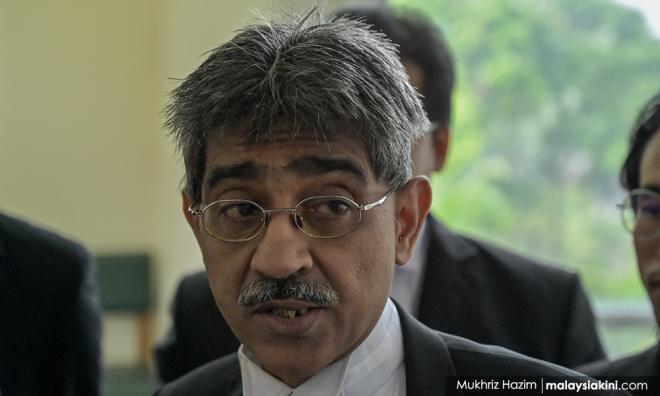Lawyer Haniff Khatri Abdulla pointed out that the National Film Development Corporation (Finas) Act 1981 was drafted to regulate the film industry, not social media.
This was in response to Communications and Multimedia Minister Saifuddin Abdullah, who told the Dewan Rakyat today it is mandatory for “mainstream and personal” media to have a Finas licence to publish work on “social media and traditional channels”.
In a statement addressed to the minister today, Haniff (photo, above) noted that the preamble of the Finas Act stipulated that it was to specifically help develop the Malaysian film industry.
The preamble reads: An Act to promote, nurture, and facilitate the development of the film industry of Malaysia, to establish the Perbadanan Kemajuan Filem Nasional Malaysia, and to provide for matters necessary therefor, connected therewith, or incidental thereto.
“The purpose and objective of the Act is to oversee and regulate the film industry including producers, distributors, and broadcasters of film works including films, advertisements, and documentaries at the time (when it was drafted), which was in 1981," Haniff said.
As for social media, the lawyer said the Communications and Multimedia Act 1998 (CMA) was specifically drafted for online spaces.
Once again, he pointed to the preamble: An Act to provide for, and to regulate, the converging communications and multimedia industries, and for incidental matters.
"Saifuddin should not err in extending the meaning and purpose of the Finas licence, while mandatory for the film industry under the Finas Act, to the extent it interferes with the jurisdiction of the CMA," he contended.
Haniff elaborated that the CMA is responsible for regulating multimedia systems including personal communications like personal video recordings and personal entertainment activities like Instagram and TikTok.

He further argued that compelling individuals to apply for a Finas licence for personal communications and multimedia use was the “wrong way to control rights to speech”.
“This is a basic right enshrined by Article 10 of the Federal Constitution,” he added.
Minister can make exemptions
According to the Finas website, one must have a registered private limited company with RM50,000 in paid-up capital to qualify for a film or video production licence.
Following his explanation this morning, Saifuddin has come under intense criticism from lawmakers and Malaysian social media users.
Chiming in, Saifuddin’s predecessor Gobind Singh Deo urged the minister to exercise his power under Section 34(A) of the Finas Act to exempt people from provisions of the law.
“He should look at that provision carefully, be realistic and practical in keeping with new technology and the media landscape of today,” said the Puchong MP in a Facebook post.
Gobind (photo), who is also a practising lawyer, further branded the application of the Act on social media users an “impractical” move.

“Perikatan Nasional takes a regressive stance on film and social media which could significantly curtail media freedom. It is impractical to expect or require all social media users to comply with sections 21 and 22 (of the Act).
“Even if those sections include social media, which is arguable, the minister need not take that position,” Gobind said.
Section 21 prohibits persons from engaging in production, distribution, and exhibition of films all at once. Persons are only allowed to participate in a combination of two of the three activities.
Section 22 compels persons to obtain a licence authorising them to engage in the activities.
- Mkini



No comments:
Post a Comment
Note: Only a member of this blog may post a comment.